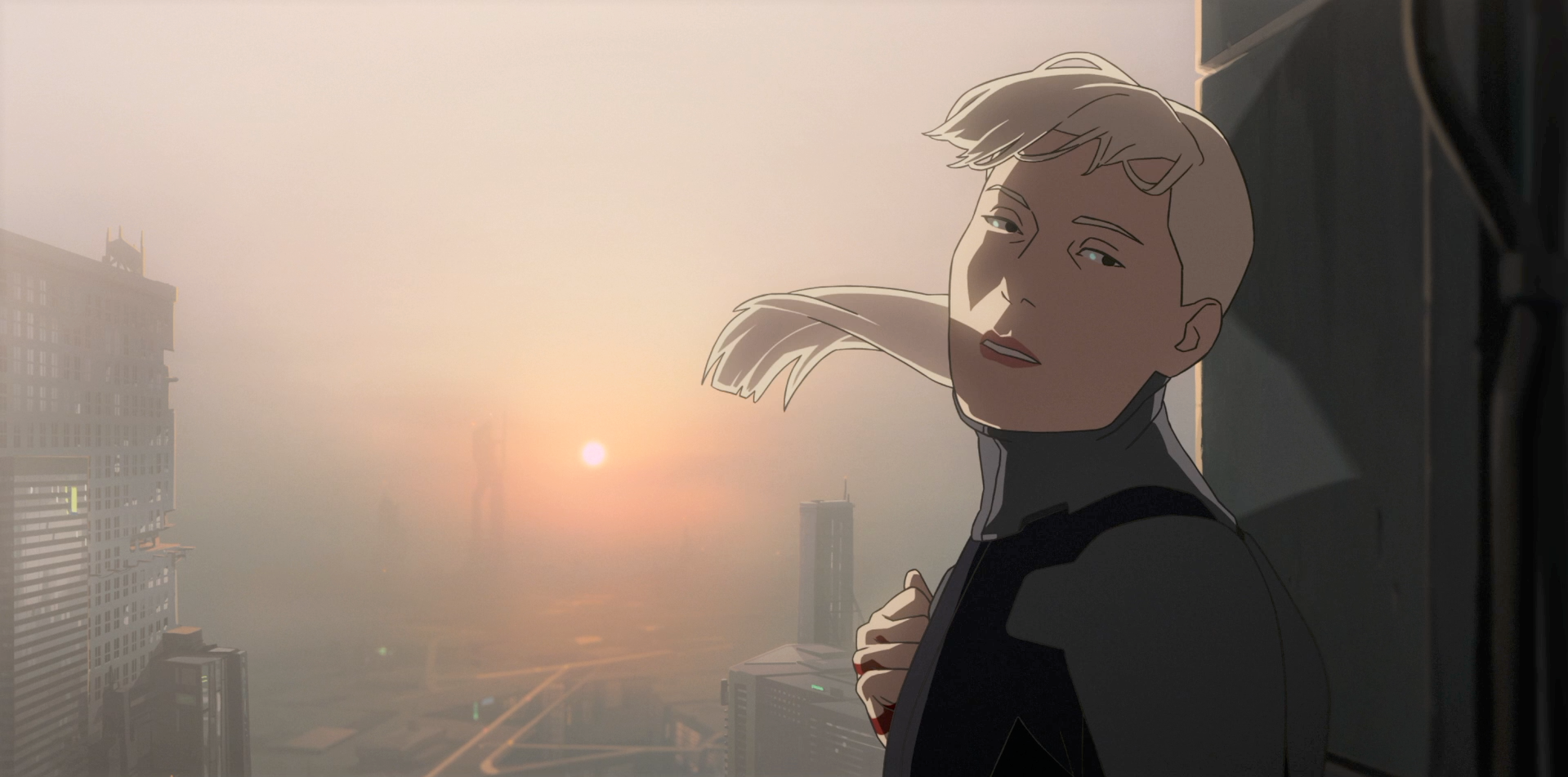
There’s a lot of familiarity on the surface of Mars Express. With its neo-noir tale set against a futuristic society of robots, this is well-treaded science fiction for touching on the intersection of tech and humanity. Thankfully, director Jérémie Périn finds far more than stylish animation to make this film more of its own thing rather seem like another Blade Runner clone. The theme of humanity’s relationship with tech sings far more beautifully here when you care about the characters beyond the slick worldbuilding and animation (although it does boast those traits as well).
For being set on 23rd-century Mars, there are characters worth caring about in this civil war of robots and humans. Investigating a series of murders are detectives Aline Ruby (Léa Drucker), a bitter human who retreats to the bottle, and Carlos Rivera (Daniel Njo Lobé), an android who once human and struggles with his new identity. They have conflicting feelings about the murders they track and the hackers they apprehend. Tensions are high with anti-robot protestors in the streets and jailbroken robots running amok with their illegally modified sentience. It’s a complex situation ripe with conspiracy, but the mystery never loses sight of the characters.
It’s easy to identify with the two leads as they’re not portrayed like cold-as-ice private investigators. Ruby does her best to mask her emotions while on the clock, but a few drinks turns her into a coping drunk that grows bittersweet about her line of work. On the opposite end of the spectrum is Carlos, unable to heal the wounds of the past as his wife and child have moved on without him. The two detectives are surprisingly open and make multiple attempts to show some humanity in their duties. They’d have to considering how violent Mars is becoming with its distrust of technology and a terrifying conspiracy of robots rebelling against humans.
Visually, the animation works well with its lusciously cel-shaded computer animation and restrained movement. The attention to detail also deserves mention for how intricate this society has been planned out. There’s an exciting car chase involving hovercrafts on a freeway with a surprising amount of thought placed in handling car crashes. Protective foam secures Ruby and Carlos within the car as emergency robots are dispatched overhead to remove them from the vehicle. While they work, there’s great tension about how quickly Ruby will be freed to fire back at the hitmen targeting her. I also found it compelling how the connection between androids has a sexual component that feels more genuine than being played up as a silly Futurama joke.
The heart is what matters most in a film like this, where the drinking of Ruby and the melancholy of Carlos are not played with casual cliche. My mind drew back decades to the CGI-animated Appleseed, where an android character directly poses the thesis of nearly every robot-based narrative: “What does it mean to be human?” Mars Express, by comparison, is a film with more assertive characters who never reduce their existential plight to such simplified soundbites. The humans and androids not only realize their limitations, but find it easier to assert themselves where they stand politically. This leads to another human-robot duo on the side of androids with great charisma. The hacking human cackles at her ability to circumvent the law while her robot companion, having suffered much brutality by humans for his very existence, tells his attackers to go fuck themselves. It’s that spirit of determination and rebellion that makes this film so engaging beyond solving the case of the murdered androids.
Mars Express feels like reading one of the better sci-fi stories in Heavy Metal and following along to its satisfying conclusion. This animated film certainly dives into the deep end with how it favors a darker resolve of a bitter noir and the grander acceptance of our own existence bound beyond our perspectives of law, tech, and commerce. It’s the type of film that I could only see working this well in animation in terms of its brutal writing and detailed world, making a great case for why animation shouldn’t be so rigidly bound by the PG demographics. This is that intelligent dose of animated sci-fi that grapples with the tougher questions worth asking and never giving easy answers, though it will give you some breathtaking visuals worthy of Blade Runner or Ghost in the Shell with an equally insightful script to boot.

 “Deadpool & Wolverine” Review
“Deadpool & Wolverine” Review  “The Boys: Season Four” Review
“The Boys: Season Four” Review  “The American Society of Magical Negroes” Review
“The American Society of Magical Negroes” Review  “Twisters” Review
“Twisters” Review  “Sausage Party: Foodtopia” Review
“Sausage Party: Foodtopia” Review  “Robot Dreams” Review
“Robot Dreams” Review  “Godzilla x Kong: The New Empire” Review
“Godzilla x Kong: The New Empire” Review  “Slave Play. Not a Movie. A Play.” Review
“Slave Play. Not a Movie. A Play.” Review 



